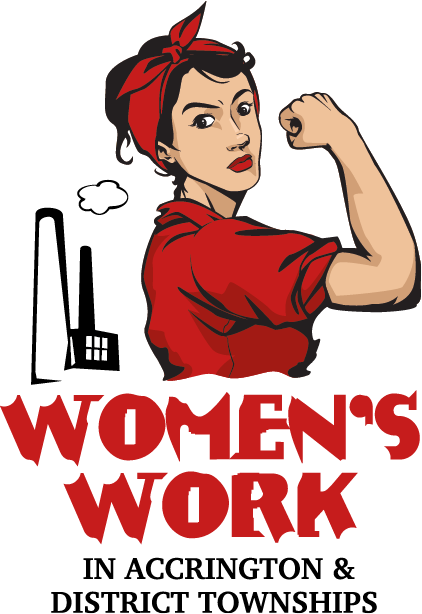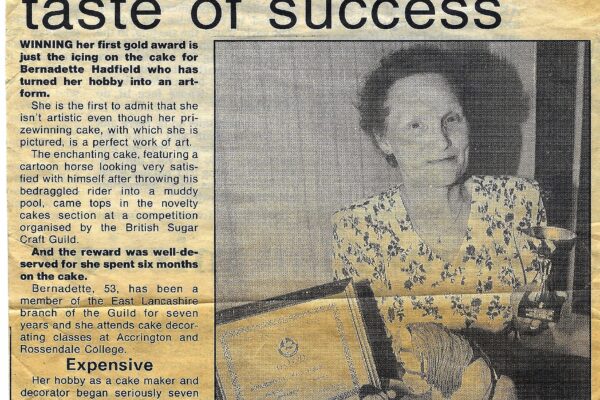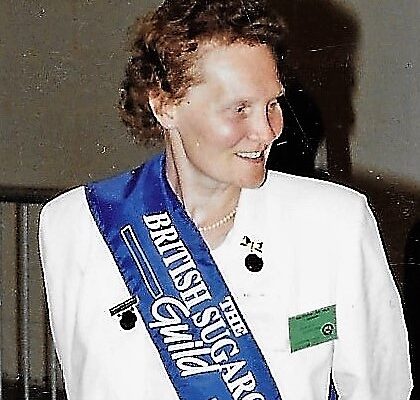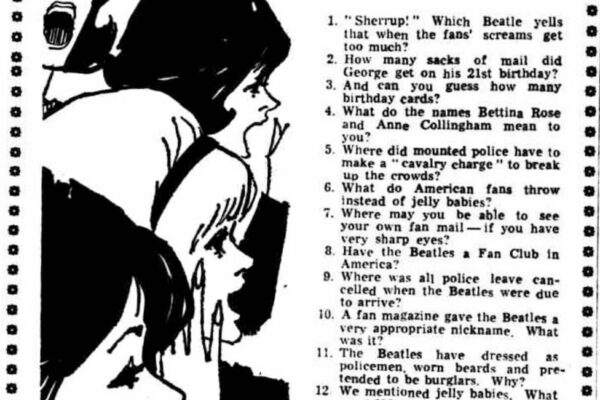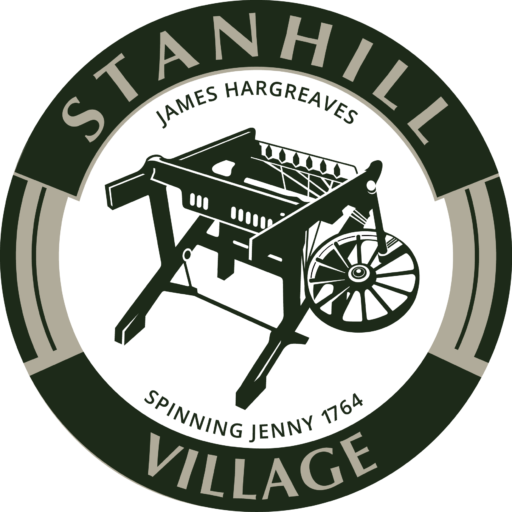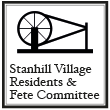My name is Bernadette Hadfield, my date of birth is 7th of the 8th, 42.
I was brought up in Haslingden, Old Road in Oswaldtwistle. We lived in a cottage and my father during the war did the tyres for a company – retreading tyres to get through the war. After that my father worked as what they call a lengthsman. My mother worked in a factory near Blackburn, doing saws, making small saws to saw wood with. We went to school down in Oswaldtwistle at St. Mary’s in Oswaldtwistle. I had two brothers, Bernard and Christopher. There was two years between all of us.
My eldest brother went to Blackpool to train as a chef in a hotel and I was sent off to boarding school in Almondsbury near Bristol. When I was home from school my parents received a letter saying “Please could you keep Bernadette’s elocution lessons up as we have to restart when she comes back from Lancashire.” I stayed there until I was 14 and just after 14 my father passed away and this is why I left boarding school and came back home and went out to work.
If I had stayed at boarding school, the training that I would have been given was to be a secretary, going either into a typing pool or to be someone’s secretary.
When I left school, I was nearly 15. I left at 14 but by the time the school holidays were over, because my birthday was in August, I was then 15 and went out to work. My first job was to go into a shop in Blackburn called Wilsons. It was a ladies’ outfitters that did heavy coats on the bottom floor along with suits. On the second floor there were skirts, dresses and bridal wear and on the top floor was childrenswear. I stayed there until I was about 16 and moved then to Bata Shoes in Accrington where I stayed until I was about 17 and then went to Burnley to work at Elgins in Burnley as a sewing machinist.
When I was 15 and went to work in the ladies’ outfitters, my first wage was £2.50, 2 pounds 10 shillings in old money. I didn’t keep my wage because with my mother being widowed, and at that time she wasn’t well, and my younger brother was at home, the money went straight to my mother and I was given a pound to sort out my bus fare and anything else I needed for the week.
We were working from 9 o’clock through to 5:30. As a 15-year old you weren’t allowed to work till 6pm. The hours of the shop where 8:30 through till 6 but there was some sort of act then that children of my age had not to work that amount of hours. In those days they had half days so that it was Monday, Tuesday, Wednesday and Thursday was a half closing day so we worked from 9 o’clock to 12:30 and had the half day off and then Friday and Saturday.
When I went to work at Burnley (in Elgins), I used to catch a bus in the morning, and we started work at half past seven. By this time, I was older and could work full-time and we worked from half past seven in the morning till 5 in the evening and I got on the bus backwards and forwards from Accrington through to Burnley and back. And then they put on transport because there were quite a few people coming from Accrington and Oswaldtwistle so then we caught the works bus. I worked there until I was married, and Elgins then opened a factory in Oswaldtwistle, on Moscow Mill Street it was, a chapel, which made it rather easier for people in Accrington and Oswaldtwistle to go to work.
When I was working at Oswaldtwistle at Elgins, we made ladies’ underwear, which meant waist skirts, full skirts, nightwear and ladies’ briefs. At that time, there was a carnival going on, and I think it was just the Oswaldtwistle one, and we had a float where the ladies displayed the negligees, the pyjamas, the underwear, which was very much protected by our spouses that walked by the side of the float to make sure no-one did any silliness to us.
On having been married and having a first child, I went back to work, but you couldn’t go to work if you were putting a child into nursery until the child was potty trained. And then the nursery would accept them. I went back to work full-time but before that I went back to work part-time as a sewer at Highams, who ran an evening shift that was sewing sheets. And we all, most of our ladies in those days, went back to work because there were facilities, or the husbands looked after them in the evening time. But I went back to work at Elgins to begin with and I took my child to Eagle Street Nursery and then from there I caught a bus into Oswaldtwistle and worked there. But by the time I went back to work I also had been interviewed as a supervisor-cum-manageress for Elgins in Oswaldtwistle which made my wage much much easier for us to be able to live.
My husband was a bus driver and also worked funny hours so it was easier for me to go back on full-time work with the actual nursery, rather than rely on someone looking after the child when my husband was on lates on the buses.
When we decided that we could afford to have a second child, 6 weeks after the child was born unfortunately my husband had an accident which caused a spinal injury. In those days you didn’t claim as they do today, so I went out to an evening shift again at Highams, but at that time while my child was so small, the lady that was next door but one to me was a councillor and she advised me to go to the social services. I did this and a gentleman came and took all the details and I had to do a week with accounts of what I spent in a week. And the gentleman returned about 2 to 3 weeks later and was very apologetic saying I’d been too honest and the only amount of money they could give me, in a book that you go to cash in at the Post Office was 7 shillings and sixpence, which I refused.
This is when I went back to work on the evening shift at Highams, and then later went back full time. As the baby got older, I could put the child into nursery again, because my husband wasn’t capable when he arrived home in a plaster cast from the chest down to the bottom of his back, so he wasn’t capable of looking after the child. So therefore, my youngest went into nursery again. By this time we had two girls.
One of the lightest parts of working at Elgins was a story that happened. At that time the Beatles were just appearing in the 60s and if you can remember, and the ladies of my age will, in the sewing room we used to have Workers’ Playtime music played through, into the works, into the sewing room. (This was where ladies and gentlemen alike were feeding the sheets…we used to sew sheets, hem sheets and pillowcases in the sewing room, that were made, cut and made further up in the works, because it was the weaving place).
But this particular day the Beatles were singing on the Workers’ Playtime and the one with the (hair) cut, and they used to shake their heads saying yeah yeah yeah and of course everybody joined in. I think the manager must have been not in a good mood because he turned the radio off and refused to let us have the radio back on again, not even for the afternoon one (shift).
I did not live far from where Elgins was, so when I had come back from dinner all the sewers were outside and some of the ladies that supplied us with work and the rest of them and I said what’s the matter is there a fire or something? They said no we’re on strike! And they came out on strike because of the Beatles and we couldn’t have our radio back on.
In due course we did have the radio back on but coming up to Christmas, when we had our Christmas party in the sewing room, the owner of Highams came into the room and he had a Beatles wig on and he started the party off with yeah yeah yeah, which was quite funny really, but we did make the Lancashire Evening Telegraph with the strike for the Beatles.
It was extremely funny, it’s some of the things you look back on, as the working days isn’t it that it wasn’t just always boredom with the same thing over and over again.
PAY AND PIECEWORK
Because we were piecework you see, we made our own wages. We had a basic wage, and (on top of that) we made our own wages. Simply because if you were a quicker worker than someone else and you were doing more work than the person say two or three machines away from you and why should you not get paid for producing more work?
It was a very good system. I mean there were some girls who were extremely fast, and their work was absolutely spot-on. I mean you could get people that were fast but work not good. They used to get a lot of work back to repair so then they lost whatever they’d made so but yes I think that was very good, but it also meant that if somebody…how can I put this? if someone wasn’t quick at picking things up … …we had 2 inch and 1 inch hems on sheets, and you used to have to spin the hem around. You had an inch and a 2 inch and a quarter inch all on one hemmer, and you had to spin it around onto your machine to do that hem and spin it back to do the other hem, and if you weren’t… adaptable – if you weren’t quick to be able to do that, then obviously you were slower and even though you were fast at doing one hem , to stop and turn your hem around to do the other hem you lost your time , … whereas other people could very quickly whip it round and fasten it back down and get going again.
I know they did actually change that method. At this time you had the sheets folded on the bench, whereas when they modernised … they (the sheets) were on a hanger next to you and you threw them over and did all one side and then someone came and turned it around and you did all the hems on the other side. So obviously the management realised that they were losing production with having to fold and unfold the sheets … so now they came through on a trolley hanging up next to you. It was like a rail of clothes and these (sheets) hung over and you did all down one side and when you got down to the other side then someone would come and turn your trolley round and you’d do all the other side as a different hem. That meant then that you weren’t keep on flicking your hemmers backwards and forwards…much quicker and you made more money.
I just went in and worked and came away, probably because I at that time, had to look after my two children and my husband. And therefore, I didn’t even think of any promotion or anything like that until I left Elgins – Highamses and went to work at Accrington Brush.
When I was working at Highams in the sewing room there were quite a few men working with us, but the men were there to actually do the heavy work, moving pallets of work about so therefore there wasn’t any argument about the men being paid more than the ladies working on the machines.
There was a union in the workshop where we worked. I don’t know if the men’s union was the same as our own, but our union was very good at making sure our pay kept up with the amount of work that we did and the amount of promotions that went on. There was never any dispute about what we did with the unions…there were rules brought in, as there was with the smoking. Because we’re in a weaving shed it was very dangerous for people that smoked and setting things on fire, and at one stage they actually banned smoking in the workplace, which the union took up and they did provide a room that was isolated for people and dedicated times for people to go and have their smoke.
When my husband returned to work as a bus driver, after the spinal injury that he had, he had only been at work a couple of weeks when they the buses came out on strike. The union brought them out on strike. I cannot remember why they brought them out, but they did and with the fact that we were on a very low budget, and we had two children and now my husband was out on strike, and no wage after being off for so long and being on a low sick pay (it was very difficult). We were down in town once and we were refused in shops because we were on strike and it was affecting their business.
This I find was very unfair as it wasn’t my husband’s fault, and it was none of the other people’s fault. When the union brings you out on strike you have to come out or be black-legged. This went on for some time. Fortunately for myself and my husband people around where I lived actually dropped off food parcels on my door knowing full well that we were struggling. But we weren’t the only people that struggled and hopefully it happened to other people that worked on the buses because some people, it weren’t just one member of the family working for the Corporation, sometimes it was husband and wife. The wife being the conductress and the husband being the driver, so they also would have suffered deeply.
As far as work was concerned, for ladies and also for gentleman in that period of time, it was much easier than it is today. We had a lot more places that employed us, we had the mills, we had a lot of shops and also markets. Children could get Saturday jobs on the market.
We had also paper rounds, but these days, I would not like to live in these days. It is much harder to find work, we don’t make most of our own things. We had loads of manufacturing, even as far as engineering places. We had quite a good area to be able to go and find a job if you weren’t happy in one. You could be out of work on the Friday and back in work on the Monday which was much easier than it is today. You know you could flit from job to job quite easily.
I left Highams… because the work was quite heavy work, when you’re shaking out sheets and suchlike and unfortunately, I had women’s trouble and the doctor had advised me to find a lighter job. At this particular time Accrington Brush was looking to start a new department. They were starting a working place for making stretch hoses for vacuum cleaners and they were looking for a manageress to run this department and train people how to make the actual hoses and later how to put the cuffs on for selling them on onto the market stalls and such like. I fortunately managed to get this job and it was much lighter, but this was also because I’d already had management experience with Elgin.
Later I did go back to Elgin as the manageress as unfortunately there had been a dispute in Accrington Brush because I had left my husband. My husband had made quite a big fuss in the Accrington Brush company and I was asked to leave. I was then living on my own with my two girls and I saw an advert for Elgins for a manageress in Oswaldtwistle. I went through to the main factory in Burnley and was successful because they already knew me and knew that I knew how the system worked and I was very fortunate to get the management place in Elgins. It also helped that it was a monthly pay job and it helped with me bringing my daughters up and buying a house.
When I arrived in the factory to start my new job in Elgins, I was greeted very warmly by the people that I used to work with and also I found that some of the people I was going to be working with, were some of the ladies that used to go to school with me in my early days before I went out to boarding school, which was very pleasant because we caught up on what I’d missed out while I wasn’t going through the normal schooling in Oswaldtwistle. It helped and they were very good at also coming to me because they knew me, and they could speak to me about their work if there was something wrong on the factory floor.
When I was buying my first house as I left my husband, I was very fortunate that Lloyds Bank gave me a loan to buy the first house which was only then £700. On being in it for the first 12 months, well less than that, there was no bathroom, only one cold tap, and there were two pin plugs in the house, which wasn’t legal at the time. So my daughters and I were looking around for another house which is the house that I live in now, and we bought it from Mortimers. I had to go to the main office in Preston to get the mortgage as it was a reclaimed house.
The gentleman who interviewed me was very off-hand, very snooty. He actually said to me, “And how does a lady on her own expect to be able to buy a house and to keep up the payments?” With that, since I had been on my own, and I had been very strict with my children, we hadn’t had anything that we didn’t need, I had managed in that time to save £2,000 and I had taken a cheque with me for the deposit on this house.
So I got up and I said to him “Right sir, I have found you very very aggressive towards me. I have come with a cheque, a banker’s cheque, to pay you for the deposit for this house but I am leaving now, seeing as you object to a lady being on her own with a family and cannot as you say, expect to support and pay a mortgage. I shall report to you, when I leave here, to your head office.” And I got up to leave and he got in front of the door and apologised, ordered a cup of tea and I got a 90% mortgage. And this is what you should do ladies, if anybody thinks you are not capable of doing anything, because we are capable of anything.
Just because we’re women, I mean we kept going through the war, so we can do anything if we put our minds to it.
Many years later, I remarried and the husband that I had, I called him my gentle giant. Mr Ron Hadfield was Accrington Brushes manager and I think as part of the dispute that went on, my husband thought that things would going on between us. In actual fact there weren’t but it did throw us together. He supported me through my working life. I moved from Elgin and started a sewing room in Accrington sewing rosettes which was Prestfield Fabrics and from there I finished up up.in a sewing area. When I left there, I finished up in another sewing area sewing uniforms for workers and that was run by a lady called Janet Catlow and she called her sewing place JanCraft.
I enjoyed working at all my jobs at sewing , ups and downs like everybody has, but in the meantime I’d also been making cakes for my daughters, for my daughters’ friends and it led me to what is known as sugarcraft, which is British Sugarcraft and there are plenty of areas and clubs round about. You don’t have to be a practiced or a qualified person to do sugarcraft. You make a cake for your children, they enjoy it and it’s made with love and that’s all it needs.
From there though we went to exhibitions and I applied and went through training as a sugar craft demonstrator, which Ron and I went around the country you know part-time. We used to take the weekend off and go and demonstrate different parts of sugar craft and this is where it’s led me to do sugarcraft for the WI. And when I retired altogether, out of mischief I applied for a job at the Nelson and Colne College. They were after an evening person to do sugar craft evening time. So I applied and I got the job, it was wonderful! I’d never been paid so well and doing something that I enjoyed. The only thing that did come up was the fact that I had to have a teaching certificate.
Going back to school or to college was quite hard work but my darling husband bought me a computer and we went through learning how to make essays and all the research that we had to do until I actually gained my teaching certificate. And I taught at Nelson and Colne College for 10 years and thoroughly enjoyed it as that was the end of my career as now I am retired altogether.
If I hadn’t had my husband as support, I don’t think I would have (had that second career) because I came out of school without any qualifications when my father passed away… hadn’t done full-length in school and actually, at that time there were no qualifications – you just came out of school and went chasing work unless you were very brilliant.
I wouldn’t like to be the women working today. I don’t think they have the opportunities, and I don’t think they are treated as well as we were treated if you wanted to climb the ladder. I think if you had the ability to go forward and put yourself forward, no one took advantage of you as they do today. No, I wouldn’t like to be in your position today.
I don’t know, that’s life – it threw things that us and as long as you take the experience that you’ve had. I think while I was away at boarding school the elocution had helped me. I think because I spoke differently it did help me get through, get to different places that probably if I hadn’t had the elocution lessons and the deportment classes as well, with walking with books on your head, I don’t think I would have got as far, I don’t know.
These are things…people ask… would you like to live your life again? I say no. I’ve been through my life and the life of today is completely different to the life that I came through, but you youngsters don’t know any different, so therefore you wouldn’t appreciate I don’t think, going back into my life because yes, we had cold water, we hadn’t central heating and we hadn’t as many cars. We walked, we caught buses, and we, I think, enjoyed life better than you do with all the technology that’s about, because you don’t use your body and you don’t use your mind as much. Because things will spell things for you, like it did on my computer helping me when I was learning to go through teaching. No. I haven’t even forced myself to go whichever way, I have just followed whatever has come up in front of me. And I am very thankful that I have finished up with a much easier life then I started off with.
If the opportunity was there and I have told this to my children, if they haven’t got what they went after you weren’t meant to have it. It’s not meant to be. Just wait and something will come up. Just keep on trying and sooner or later, you’ll get to where you want to be. I don’t know whether or not I’ve just been lucky. I haven’t had it easy- there’s a lot of things I haven’t told you. I’ve only told you the good parts of my life. I haven’t had it easy, but at the same time I’ve taken whatever’s been thrown in front of me and used it.
Life is life and I followed it through. I’ve never planned anything. I followed it. I’ve never planned what I wanted to do, where I wanted to go, I just followed it and if it led me somewhere good then I’d be quite happy with it.

